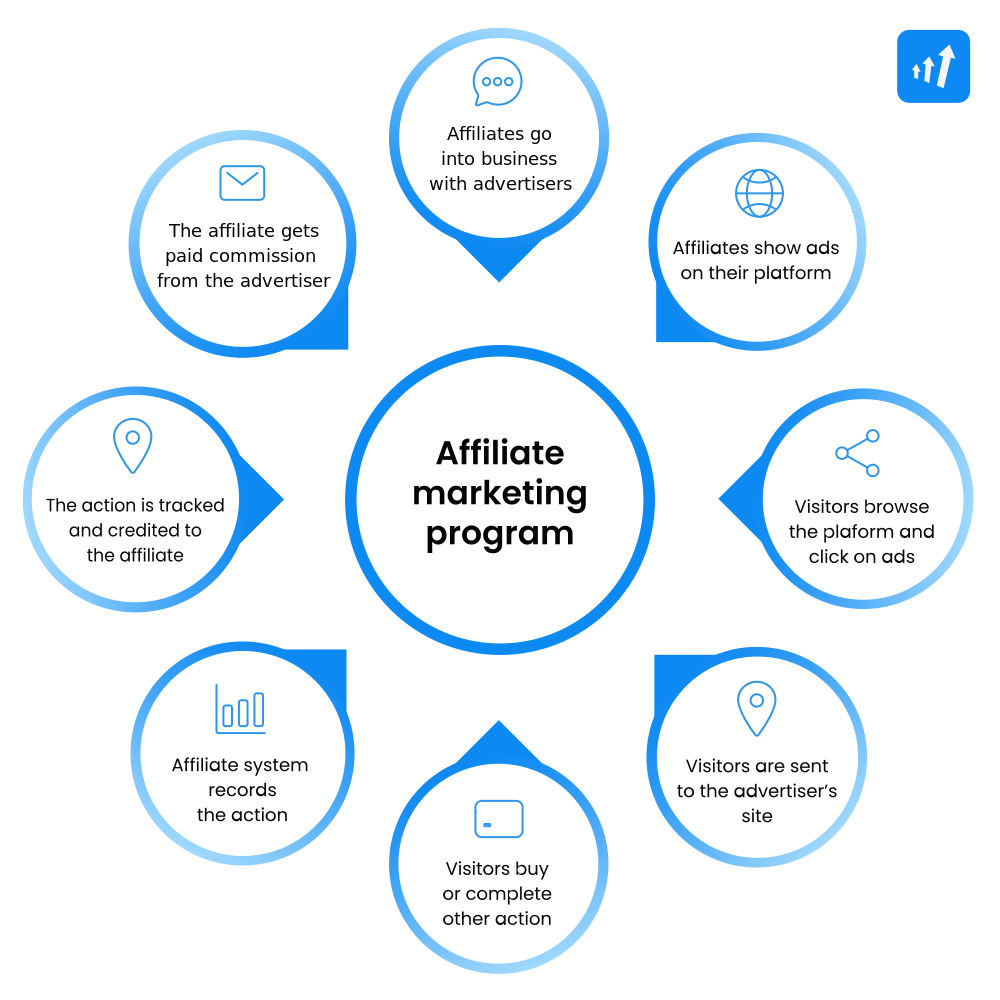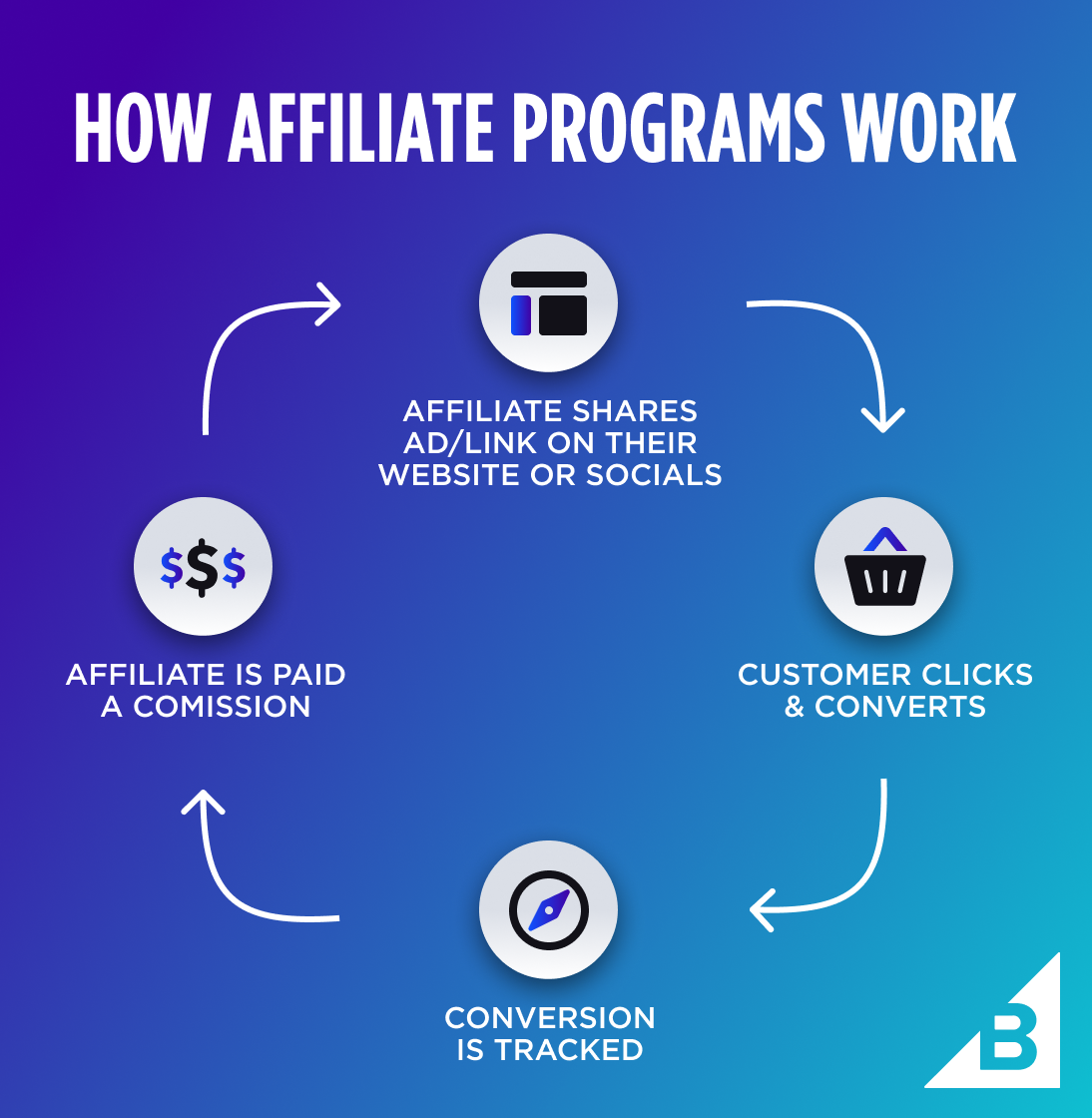What is the Meaning of Affiliate Marketing System: Unveiled!
Affiliate marketing system is a performance-based strategy where affiliates earn commissions for promoting products. It’s a mutually beneficial partnership between merchants and affiliates.
In this digital age, affiliate marketing has become a popular way for businesses to reach a wider audience and for individuals to earn passive income. By leveraging the power of affiliate marketing, companies can increase their sales and brand exposure while affiliates can generate income by promoting products they believe in.
This system allows for a cost-effective and scalable way to market products and services, making it a win-win situation for all parties involved. As technology continues to advance, affiliate marketing will likely remain a key component of many businesses’ marketing strategies.

Credit: www.postaffiliatepro.com
The Essence Of Affiliate Marketing
Affiliate marketing is a performance-based system where businesses reward affiliates for driving sales or leads. Through partnerships, affiliates promote products or services, earning commissions for successful referrals. This marketing strategy leverages the power of collaboration to boost brand visibility and increase revenue.
Breaking Down The Basics
Affiliate marketing is a type of performance-based marketing that involves promoting another company’s products or services and earning a commission for each sale or lead generated through your unique affiliate link. Simply put, it’s a way to make money online by promoting products that you believe in and earning a percentage of the profits.
The process of affiliate marketing involves three parties: the merchant, the affiliate, and the customer. The merchant is the company that creates the product or service, the affiliate is the person promoting the product, and the customer is the person who buys the product through the affiliate’s link.
The Evolution Over Time
Affiliate marketing has been around for decades, but it has evolved significantly over time. In the early days, affiliate marketing was primarily done through banner ads and paid search campaigns. However, with the rise of social media and content marketing, affiliate marketing has become more about building relationships and providing value to your audience.
Today, affiliate marketing is a multi-billion dollar industry that includes everything from small niche bloggers to large media companies. With the growth of e-commerce and the increasing importance of digital marketing, affiliate marketing is only set to become more important in the years to come.
In conclusion, affiliate marketing is a powerful way to make money online by promoting products that you believe in and earning a commission for each sale or lead generated through your unique affiliate link. Whether you’re a blogger, social media influencer, or content creator, affiliate marketing can be a valuable addition to your online business strategy.

Credit: www.bigcommerce.com
Key Players In Affiliate Marketing
Affiliate marketing is a collaborative effort involving various key players. Understanding the roles of these players is essential for anyone looking to succeed in the affiliate marketing system. Let’s delve into the key players in affiliate marketing and their respective roles.
Roles Of Merchants And Affiliates
Merchants, also known as advertisers or vendors, are the companies or individuals offering products or services. They are the ones who create and provide the products that affiliates promote. Affiliates, on the other hand, are individuals or entities who promote the products or services of merchants in exchange for a commission. They play a crucial role in marketing the products to their audience, driving traffic, and generating sales for the merchants.
Networks And Platforms: The Middlemen
Affiliate networks and platforms act as intermediaries between merchants and affiliates. These networks provide a platform for merchants to showcase their products and for affiliates to find suitable products to promote. They handle the administrative tasks such as tracking sales, managing payments, and providing reporting tools. Affiliate networks also offer a wide range of products across different niches, making it easier for affiliates to find relevant products to promote.
How Affiliate Marketing Works
Affiliate marketing is a popular and lucrative online business model that allows individuals to earn money by promoting products or services for other companies. It works on a simple principle – you promote a product or service, and when someone makes a purchase through your unique affiliate link, you earn a commission.
The Process Explained
In affiliate marketing, there are three key players involved: the merchant, the affiliate, and the customer. Let’s take a closer look at how the process works:
- The merchant: This is the company or individual that owns the product or service. They want to increase their sales and reach a larger audience, so they offer an affiliate program.
- The affiliate: This is you, the person who promotes the merchant’s products or services. You sign up for their affiliate program and receive a unique affiliate link.
- The customer: This is the person who clicks on your affiliate link and makes a purchase from the merchant.
Now that we understand the players involved, let’s see how the process unfolds:
From Clicks To Commissions
1. You, as an affiliate, create content such as a blog post, review, or social media post where you share information about the merchant’s products or services. Within your content, you include your unique affiliate link.
2. A potential customer comes across your content and is intrigued by the product or service you’re promoting. They click on your affiliate link, which redirects them to the merchant’s website.
3. The customer browses the merchant’s website and decides to make a purchase. They complete the transaction, and the merchant’s system tracks the sale back to your affiliate link.
4. The merchant verifies the sale and calculates the commission you have earned based on the agreed-upon commission rate. The commission is typically a percentage of the sale value.
5. The merchant then credits your affiliate account with the commission earned. Depending on the affiliate program’s terms, you may need to reach a certain threshold before you can withdraw the funds.
6. Finally, you receive your commission! The more customers you drive to the merchant’s website through your affiliate link, the more commissions you can earn.
Affiliate marketing is a win-win situation for all parties involved. The merchant gains exposure and increased sales, the customer discovers new products or services, and the affiliate earns a commission for their promotional efforts.

Credit: optinmonster.com
Types Of Affiliate Marketing Models
Affiliate marketing models encompass various structures, including pay-per-click, pay-per-lead, and pay-per-sale. These models enable businesses to collaborate with affiliates who promote their products or services in exchange for a commission. This system allows for a cost-effective marketing strategy and mutually beneficial partnerships between businesses and affiliates.
Affiliate marketing is a popular online business model that allows individuals and businesses to earn commissions by promoting products or services on behalf of a merchant. There are several types of affiliate marketing models that can be employed to generate revenue. In this article, we will explore three common models: Pay-Per-Sale, Pay-Per-Click, and Pay-Per-Lead. Let’s delve into each of these models and understand how they work.
Pay-per-sale: The Classic Approach
Pay-Per-Sale (PPS) is the most traditional and widely used affiliate marketing model. As the name suggests, affiliates earn a commission when a sale is made through their referral link. This model offers a straightforward and transparent way for affiliates to earn income. When a customer clicks on the affiliate’s link and completes a purchase, the affiliate receives a percentage of the sale as a commission.
With Pay-Per-Sale, affiliates have the opportunity to earn higher commissions, especially if they are promoting high-ticket products or services. This model incentivizes affiliates to drive quality traffic and convert visitors into paying customers. It also ensures that affiliates are motivated to promote products that have a higher likelihood of generating sales.
Innovative Models: Pay-per-click And Pay-per-lead
While Pay-Per-Sale is the classic approach to affiliate marketing, there are also innovative models that offer different ways for affiliates to earn commissions. Two such models are Pay-Per-Click (PPC) and Pay-Per-Lead (PPL).
In the Pay-Per-Click model, affiliates earn a commission whenever a visitor clicks on their referral link, regardless of whether a sale is made. This model is often used in conjunction with advertising platforms like Google AdWords or social media advertising. Affiliates are compensated for driving traffic to the merchant’s website, regardless of the outcome. PPC can be a lucrative model for affiliates who are skilled in driving high-quality traffic.
On the other hand, the Pay-Per-Lead model focuses on generating leads for the merchant. Affiliates earn a commission when a visitor completes a specific action, such as filling out a contact form or signing up for a free trial. This model is commonly used in industries where acquiring leads is crucial, such as insurance or real estate. Affiliates who excel at generating leads can earn substantial commissions through the Pay-Per-Lead model.
In conclusion, affiliate marketing offers various models for individuals and businesses to earn commissions. Pay-Per-Sale, Pay-Per-Click, and Pay-Per-Lead are three common models that cater to different goals and strategies. Whether you prefer the classic approach or want to explore innovative models, affiliate marketing provides opportunities for individuals to monetize their online presence and generate income.
The Win-win-win Scenario
Affiliate marketing is a powerful system that creates a win-win-win scenario for all involved parties. Merchants, affiliates, and consumers all benefit from this unique marketing model. Let’s delve deeper into the benefits each party experiences in this symbiotic relationship.
Benefits For Merchants
Merchants gain several advantages from affiliate marketing. They can expand their reach and customer base without upfront costs, only paying for actual sales or leads. This performance-based model ensures a higher return on investment, reducing the risks associated with traditional advertising.
Advantages For Affiliates
Affiliates, also known as publishers, profit from this system by earning commissions for promoting merchants’ products or services. With minimal investment and the potential for high income, affiliates can monetize their online presence effectively. This flexibility allows individuals to work from home and build a lucrative online business.
Value For Consumers
Affiliate marketing provides value to consumers by offering them access to a wide range of products and services through various online platforms. This accessibility enables consumers to make informed purchasing decisions, often with the added benefit of exclusive discounts or promotions. Additionally, affiliates often provide helpful reviews and recommendations, enhancing the overall shopping experience for consumers.
Challenges And Solutions In Affiliate Marketing
Affiliate marketing poses challenges that marketers must navigate to succeed. Let’s explore some common pitfalls and effective strategies for achieving success in this dynamic field.
Common Pitfalls
- Choosing irrelevant products for promotion.
- Not building strong relationships with affiliates.
- Ignoring compliance and legal regulations.
- Overlooking tracking and analytics.
- Using ineffective promotional tactics.
Strategies For Success
- Research and select relevant products.
- Cultivate strong relationships with affiliates.
- Stay compliant with regulations.
- Utilize robust tracking and analytics tools.
- Implement creative and effective promotional strategies.
Measuring Success In Affiliate Marketing
Affiliate marketing success can be quantified by measuring specific Key Performance Indicators (KPIs) and utilizing effective Tools and Technologies for Tracking. To ensure the effectiveness of an affiliate marketing system, understanding and optimizing these metrics are crucial.
Key Performance Indicators
- Conversion Rate
- Click-Through Rate (CTR)
- Revenue per Click (RPC)
- Customer Lifetime Value (CLV)
Tools And Technologies For Tracking
- Google Analytics
- Affiliate Tracking Software
- Conversion Tracking Pixels
- Link Trackers
Future Trends In Affiliate Marketing
Affiliate marketing is evolving rapidly, with new trends shaping the industry’s future. Let’s explore the emerging technologies and predictions that are set to revolutionize affiliate marketing.
Emerging Technologies
Artificial intelligence and machine learning are transforming how affiliate marketing operates. These technologies enhance targeting and personalization.
Voice search optimization is gaining prominence in affiliate marketing strategies to cater to the growing use of smart devices.
Predictions And Potential
- Affiliate marketing is projected to grow exponentially, reaching $8.2 billion by 2022.
- Mobile-first strategies will dominate affiliate marketing campaigns as mobile usage continues to soar.
- The rise of micro-influencers will offer niche targeting opportunities for brands in affiliate partnerships.
Frequently Asked Questions
What Is Affiliate Marketing System?
Affiliate marketing is a performance-based marketing strategy where businesses reward affiliates for bringing customers through their own marketing efforts.
How Does Affiliate Marketing Work?
Affiliates promote products or services using unique links. When a purchase is made through their link, they earn a commission.
What Are The Benefits Of Affiliate Marketing?
Affiliate marketing offers a low-risk way for businesses to increase sales, while providing affiliates with a flexible income opportunity.
Conclusion
To sum up, affiliate marketing is an effective way to earn money online by promoting other people’s products and services. This marketing system relies on building trust with your audience and providing them with valuable information. With the right approach, affiliate marketing can be a lucrative source of income.
By understanding the basics of affiliate marketing, you can start building a successful online business today. Keep in mind that patience, persistence, and hard work are key to achieving success in this field.